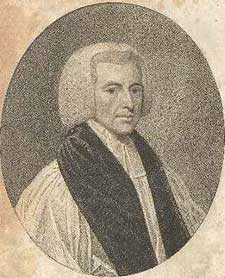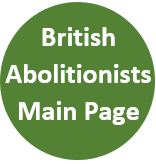Beilby Porteus (1731-1809)

Biography
Beilby Porteus's interest in the colonies must be supposed to have started early, as his parents were Virginian colonists who had returned to England. Porteus was born at York, where he went to school, before making a promising start at Cambridge. He graduated in 1752, and tutored until 1757 when he was ordained. In 1759 he won the Seatonian Prize for his poem Death: A Poetical Essay. This work, for which Porteus is still remembered, is often closely imitative of Paradise Lost but, despite extravagent praise for George II, displays Porteus's early disdain for tyranny:Ah! Why will Kings forget that they are men?By 1762, Porteus had been appointed domestic chaplain to Thomas Secker, then Archbishop of Canterbury. From 1769 he was chaplain to the king, George III and, in 1776, was appointed Bishop of Chester. He took a keen interest in the affairs of the Society for the Propagation of the Gospel in Foreign Parts, an interest which continued after he was translated to the bishopric of London in 1787, where he remained until his death. The arrangement of the Anglican church meant that British overseas colonies now came under his cure. He took part in debates in the House of Lords which opposed the slave trade and organised missions to India and the West Indies. He published several volumes of sermons as well as tracts on political as well as spiritual topics. Among these was a sermon, preached before the Society for the Propagation of the Gospel in Foreign Parts on February 23 1783, which had as its title: 'The civilization, improvement, and conversion of the Negro slaves in the British West-India islands recommended.' This sermon, drawing heavily on the as yet unpublished essay on slavery by his friend James Ramsay, argued that the Anglican church had a particular duty to convert the slaves on its own plantations. Moreover, he argued that humane treatment should be immediately enforced, regardless of whether the slaves were likely to be emancipated or not. Like many in the early 1780s, however, he fell short of condemning slavery outright in this sermon, and his policy of amelioration was always linked to his policy for conversion:
And Men that they are brethren? Why delight
In human sacrifice? Why burst the ties
Of Nature, that should knit their souls together
In one soft bond of amity and love?
If ever then we hope to make any considerable progress in our benevolent purpose of communicating to our Negroes the benefits and the blessings of religion, we must first give them some of the benefits and the blessings of society and of civil government. We must, as far as is possible, attach them and their families inseparably to the soil: must give them a little interest in it; must indulge them with a few rights and privileges to be anxious for; must secure them by fixed laws from injury and insult; must inform their minds, correct their morals, accustom them to the restraints of legal marriage, to the care of a family and the comforts of domestic life; must improve and advance their condition gradually, as they are able to bear it; and even allow a certain number of the most deserving to work out their freedom by degrees [...] as a reward of superior merit and industry and of an uncommon progress in the knowledge and practice of Christianity.The sermon was reprinted several times, and a pamphlet based on it appeared as well (1784). Later, as the abolition campaign became more mainstream, he became more outspoken, possibly because of the influence of his younger friend, William Wilberforce, with whom he participated in the evangelical Proclamation Society. As a member of the House of Lords, Porteus was foremost among those attempting to pass Sir William Dolben's Slave Carrying Bill in 1788. His other works included the promotion of a number of missionary expeditions, particularly to India. He was also famous in his day for his attempt, alongside others, to stamp about what he saw as public immorality. He died in 1809. His library, including an extensive collection of anti-slavery literature, is preserved at the University of London Library.
© Brycchan Carey 2001
Bibliography
Porteus's Works on Slavery
- The Works of the Right Reverend Beilby Porteus, D.D. Late Bishop of London: with His Life, by the Rev. Robert Hodgson, A.M. F.R.S. Rector of St. George's Hanover-Square, and one of the chaplains in ordinary to His Majesty. A New Edition, in Six Volumes (London: T. Cadell, 1823)
See within:- 'Sermon XVII. The civilization, improvement, and conversion of the Negro slaves in the British West-India islands recommended. Preached before the incorporated Society for the Propagation of the Gospel in Foreign Parts, February 23. 1783', II, pp. 391-428.
- 'An Essay towards a plan for the more effectual Civilization and Conversion of the Negro Slaves, on the Trust Estate in Barbadoes, belonging to The Society for the Propagation of the Gospel in Foreign Parts. First written in the year 1784, and addressed to the society; and now considerably altered, corrected, and abridged', VI, pp. 165-217.
- A Letter to the Clergy of the West-India Islands (London 1788)
- A Letter to the Governors, Legislatures and Proprietors of Plantations, in the British West-India Islands (London, 1808).
Secondary Works
- Carey, Brycchan, British Abolitionism and the Rhetoric of Sensibility: Writing, Sentiment,and Slavery, 1760-1807 (Basingstoke: Palgrave Macmillan, 2005). I discuss Porteus at pages 151-3. Click here for more information
- Robert Hodgson, The Life of Beilby Porteus, as above.
- John Henry Overton, 'Beilby Porteus' in The Dictionary of National Biography, vol XVI, pp. 195-197.
- Tennant, Bob, 'Sentiment, Politics, and Empire: A Study of Beilby Porteus's Antislavery Sermon', in Discourses of Slavery and Abolition: Britain and its Colonies, 1760-1838, ed Brycchan Carey, Markman Ellis, and Sara Salih (Basingstoke: Palgrave Macmillan, 2004), pp. 158-74. Click here for more information



